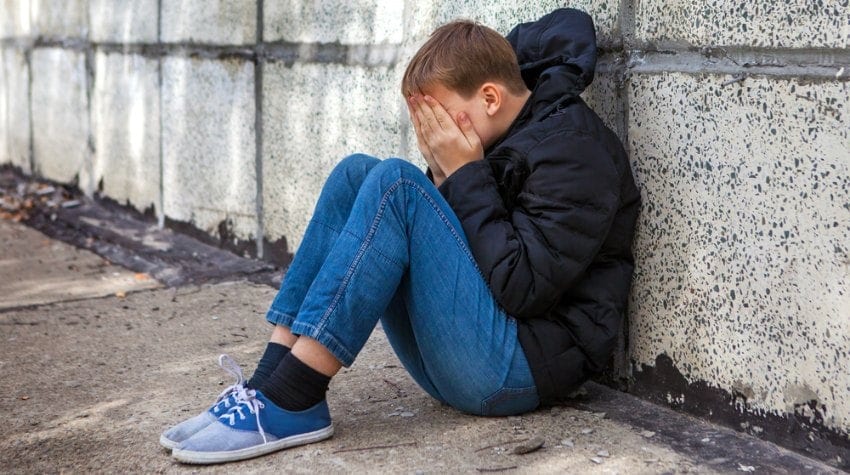

In recent years, suicide among teens have increased dramatically. Each year thousands of teenagers commit suicide in the U.S. In fact, it is the third leading cause of death for kids, aged 15-to-24-years old, and the sixth leading cause of death for those who are 5-to-14-years old.
?Think about your teen. After all, he or she is likely to experience the same strong feelings of anxiety
×
Anxiety
anx·i·ety
n.noun
Merriam- Webster dictionary defines anxiety as: : an abnormal and overwhelming sense of apprehension and fear often marked by physiological signs (as sweating, tension, and increased pulse), by doubt concerning the reality and nature of the threat, and by self-doubt about one’s capacity to cope with it
Anxiety is a very common ailment that almost everyone experiences on an almost daily basis. However, anxiety effects some more than others and can cause severe emotional distress that is too much for an individual to handle.
When anxiety plagues an individual so severely that it becomes a disorder, it is crucial that this individual receives therapeutic and emotional restoration in the form of psychological and therapeutic assistance.
Teens who experience abnormal amounts of anxiety, tend to self medicate with intoxicants such as drugs and alcohol. When negative, self medication takes place, teens are at great risk of developing harmful coping mechanisms that may be life-long lasting.
Anxiety
/anx.i.e.ty/
n.Noun
Anxiety is defined as the state of uneasiness or tension caused by the feeling of worry or nervousness caused by apprehension of possibilities of the future.
Anxiety is a common emotional trait that many people face. It affects our actions and can prevent us from making decisions. Usually anxiety holds us back from the types of things that are outgoing or out of our comfort zone and it brings fear.
Anxiety is a normal experience for most people and is a normal part of life. However, when the anxiety reaches the level of a disorder then it can be dangerous. This would include an intense, extensive, excessive and persistent worry or fear. Another factor that is caused by an anxiety disorder can be anxiety, fear, or terror attacks when the intensity of anxiety becomes very high. Types of anxiety disorders can include: social anxiety, separation anxiety and many different phobias etc.
, confusion, self-doubt, pressure to succeed, depression
×
Depression
Depression
/de·pres·sion/
Depression is defined as a mental condition characterized by feelings of severe despondency and dejection, typically also with feelings of inadequacy and guilt, often accompanied by lack of energy and disturbance of appetite and sleep.
Statistics has shown that diagnosis of depression is growing at a very dangerous rate. Globally, depression affects over 350 million people of all ages. Depression has been linked to other negative health outcomes, such as obesity, heart disease, and stroke. Compared to those not affected by depression those who face it are more likely to be unemployed and have a higher chance of divorce.
Most people that suffer from depression do not seek care or attention. Since this is a global issue, many efforts are made to help those who are suffering depression. It is important for those that face depression to find help so that they can overcome this plague that millions of people face.
and other stresses that most adolescents
×
Adolescents
Adolescents
/ad.o.les.cent/
n.Noun
The Merriam-Webster dictionary defines the term adolescent as a young person living in the transitional period between the years of puberty and adulthood until they reach the age of full maturity.
Adolescents or teenagers, are living in a turbulent and trying time in a person’s lifetime. If ill prepared, teens may flounder or display negative behaviors at home. Adolescents are prone to negative behaviors such as, drug and alcohol abuse and other chemical dependencies, sexual misconduct or acting out, failing grades at school and disrespect towards authority. It is for this reason that parents of adolescents need to be particularly mindful when they reach their teenage years.
If a teenager is struggling during thus time of adolescence it, is crucial for parents to seek the right care for their son or daughter. During this time, people are typically more susceptible to negative behaviors and dangerous habits.
suffer at some time while growing up. ?For example, divorce, the onset of a blended family with the invasion of step-parents and step-siblings that accompany it or the move to a new neighborhood can be very unsettling and can intensify a teens worries. In your teenagers eyes, at times, suicide may appear to be the most viable solution to his or her problems.
?It is important to remember that depression and suicidal feelings are treatable in either teens or adults. Your child or teenager, in particular, deserves to have his or her dysfunction recognized, diagnosed and appropriately treated. If you are ever in doubt whether your child has a serious problem, call a clinical psychologist
×
Psychologist
Psychologist
/psy·chol·o·gist/
A psychologist is a health care professional who is a specialist in the science of mind or of mental states and processes.
Psychologists are there to help support many types of people and problems. Often someone will go visit a psychologist because they have felt feelings such as depression, anger, or anxiety. Other times psychologists will help those people with a new and overwhelming job or help people to overcome grief from events that may occur.
Psychologists go through a long process of schooling and training so that the methods that they use to benefit patients in need. Typically a psychologist will use therapy to aid conflict through different methods and styles that best address the patient’s problem, personality, and preferences.
Psychologists are a valuable resource that can be used and implemented in many ways to overcome conflict and trials in different people’s lives.
for an evaluation.
The symptoms of suicidal thinking are similar to those of depression. Become aware of the following red flags that can signal that your teenager may be contemplating suicide:
?Noticeable change in his or her eating or sleeping habits
?Withdrawal from friends, family members or routine activities
?Aggressive or violent behavior, rebelliousness, running away or threats to do so
?Drug or alcohol use that is illegal, abusive or interferes with your kids functioning
?Your teens unusual neglect of his or her personal appearance; poor grooming
?A personality change that is seriously detrimental
?Manifestations of persistent boredom, concentration problems or a marked deterioration in the quality of his or her schoolwork
?Frequent complaints about stress-based physical symptoms, including stomachaches, headaches, backaches, or fatigue
?A troubling withdrawal from pleasurable activities
?Your teens angry and persistent dismissal of your praise or rewards
If your teenager is contemplating suicide he or she may also:
?Complain to you about being a bad person or about feeling guilty or rotten inside
?Provide verbal hints, such as: I won’t be a pain for you much longer, Nothing really matters anyway, Nothing helps, Nothing is important etc.
?If you notice he or she putting his or her affairs in order, for example, giving away favorite possessions or throwing away important belongings, or,
?Your teens becoming suddenly cheerful for no apparent reason after a period of depression, or if he or she says things like, I want to kill myself, or I am thinking that suicide is the best way out.
It is important to always take such statements seriously and to seek an evaluation from a clinical psychologist or other mental health
×
Mental health
Mental health is “a state of well-being in which the individual realizes his or her own abilities, can cope with the normal stresses of life, can work productively and fruitfully, and is able to make a contribution to his or her community.”1 It is estimated that only about 17% of U.S adults are considered to be in a state of optimal mental health.
The mental health in teenage boys and girls is a crucial issue and concern for parents. Teens, for a variety of reasons, tend to struggle with mental health more than adults or children who have not yet reached their teens. This is because of the turbulent time that comes with adolescence and the individual teen’s inability to cope with said turbulence.
Parents of troubled teens who struggle with mental health issues, actually have a plethora of treatment options to choose from. The type of treatment option that best fits the individual teen, greatly depends on the individual teens mental health issues.
professional. It is true that people often feel uncomfortable talking about death. However, asking your teenager whether he or she is depressed or thinking about suicide is often helpful and fulfills your due diligence as a parent.
?Do not worry; you will not put destructive thoughts in your kids head. Instead, such questions often provide assurance that you care and will give your youngster the important opportunity to discuss his problems, rather than act them out.
?If any of the red flags discussed previously occur, talk to your child about them and seek professional help if they persist. With the expert treatment of a clinical psychologist, children and teenagers who are initially suicidal can heal and return to their all-important path of normal development.
Having a child diagnosed with a conduct disorder, ADHD, bipolar disorder or other serious psychological…
If you’ve come to the end of your rope with your teenager’s behavior, you might…
For parents with a troubled teen living at home, residential treatment can feel like a…
The teenage years can be hard, but what should you do if your violent teen…
The Dangers of Social Media and Its Impact on Troubled Youth Social media is one…
Parenting a Teen with Anxiety or Depression: A Guide with Tips for Parents Anxiety and…



